|
|
|
Sort Order |
|
|
|
Items / Page
|
|
|
|
|
|
|
| Srl | Item |
| 1 |
ID:
177644
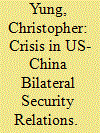

|
|
|
|
|
| Summary/Abstract |
Although the US and Chinese security relationship has been
tense for over three decades, the last three years has seen it
slide into acute crisis. The two countries are in a full-blown
security dilemma, going after each other’s “core interests,”
using their alliances and partnerships to attempt to weaken
or restrain the other, and pushing aside confidence-building measures designed to help manage the competitive
relationship. Before deriving new policy measures that can
foster habits of cooperation between the two countries, the
United States and China must create a new strategic consensus around which the bilateral security relationship can be
defined
|
|
|
|
|
|
|
|
|
|
|
|
|
|
|
|
| 2 |
ID:
177653
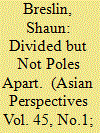

|
|
|
|
|
| Summary/Abstract |
While differences remain, the gap between US and European debates over the likely impact of China’s rise on the
global order has narrowed in recent years. At the same time,
China’s leaders have been more confident in establishing
dichotomized distinctions between their view of how the
world should be ordered and how China will act as a great
power on one hand, and what they depict as the West’s preferences and the typical modus operandi of Western powers
on the other. Despite evidence of ever clearer dividing lines
between different visions of China’s impact on the future of
the global order, this is not the same as a return to bipolarity. The problems of disentangling transnational economic
relations, different levels of followership for potential leaders, and pragmatic considerations of governance efficacy in
diverse issue areas all suggest something other than fixed
bloc-type alliances on either side of a bipolar divide.
|
|
|
|
|
|
|
|
|
|
|
|
|
|
|
|
| 3 |
ID:
177645
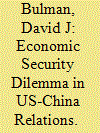

|
|
|
|
|
| Summary/Abstract |
China and the United States are caught in an economic security dilemma. In response to perceived economic aggression,
both countries now feel impelled to bolster domestic economic security through protectionist and retaliatory measures that the other side perceives as threatening. In game
theoretic terms, a mutually beneficial “Stag Hunt” coordination game devolved into an uncooperative “Prisoner’s Dilemma” after the global financial crisis. In the economic security dilemma that emerged under Trump and Xi, both sides
unsuccessfully attempted to coerce opponent behavior, further harming both economies. Using a game framework—as
opposed to a structural or leadership-based account—helps
demonstrate that China’s recent reform reversal and revisionist approaches to the international economic order were
not unavoidable parts of a long-term strategy, but rather developed partially as a response to perceived US aggressions.
|
|
|
|
|
|
|
|
|
|
|
|
|
|
|
|
| 4 |
ID:
177657
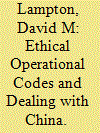

|
|
|
|
|
| Summary/Abstract |
This contribution argues that, without an ethical operational code, scholars’, policymakers’, businesspersons’, and citizens’ policy positions simply become expedient reactions to
perceived problems, opportunities, and interests. Without
ethical footing, policies as a whole will lack coherence, staying power, and persuasive force. Key elements of an ethical
operational code include: philosophical grounding and core
values, concepts of social and historical development, and
rules of thumb derived from an individual’s experience. Providing several examples of China-related policy issues which
would benefit from the ethical operational code approach,
this essay then discusses the analytic elements of an operational code. It concludes by arguing that, in the context of
US-China relations, individuals should develop ethical constructs characterized by patience, more carrots than sticks,
and more open doors than high walls. In what is emerging as
an increasingly ideologically polarized domestic and foreign
policy circumstance in the United States and in U.S.-China
relations, the starting point for an individual needs to be
self-reflection concerning what they believe and why
|
|
|
|
|
|
|
|
|
|
|
|
|
|
|
|
| 5 |
ID:
177649
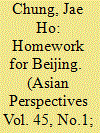

|
|
|
|
|
| Summary/Abstract |
This analysis observes that in 2020 China is a global power with global ambitions and a near-global presence. Terms
such as “G2,” “global stakeholder,” “strategic competitor,”
and “hegemonic candidate” no longer ring hollow as they
did ten years ago. However, it is unclear whether China’s
challenge to the United States will be sustainable in the medium to long run. The essay considers five hurdles in Beijing’s
path to a “responsible great power”—assuming that China
does hope to be one. Certainly, the world does not wish to
see the emergence of an irresponsible China.
|
|
|
|
|
|
|
|
|
|
|
|
|
|
|
|
| 6 |
ID:
177646
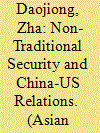

|
|
|
|
|
| Summary/Abstract |
This essay discusses setbacks to societal level of interactions
between the United States and China resulting from the
Trump administration’s turn to comprehensive confrontation. Bilateral cooperation in areas like public health, technology trade and development, law enforcement, and trade
in food and energy has been severely curtailed. Future efforts to repair damage to bilateral relations will have to begin with these and related areas that indisputably have a
direct impact on individual welfare in the two societies.
|
|
|
|
|
|
|
|
|
|
|
|
|
|
|
|
| 7 |
ID:
177655


|
|
|
|
|
| Summary/Abstract |
US-China health cooperation reaches back to the signing of
the bilateral Science and Technology Umbrella Agreement,
their first agreement after normalization of diplomatic relations in 1979. Bilateral cooperation has shaped the China
Center for Disease Control and Prevention (China CDC) and
produced some of the world’s finest epidemiological research over the last thirty years. US-China research and technical cooperation has covered the full range of health-related topics, with no area given more attention than research
and technical cooperation on emerging infectious diseases. In the wake of the outbreak of severe acute respiratory syndrome (SARS), the United States ramped up the staff
presence of its Center for Disease Control (CDC) in China.
Although this changed in the Obama years, as China’s epidemiological capacity developed rapidly, the dramatic shift
occurred with the Trump administration, whose cuts, just as
COVID-19 arose as the largest epidemiological threat to the
world in a century, left only a skeleton staff in place, and the
US government without eyes and ears on the ground. Nonetheless, there is a reservoir of mutual respect and willingness
to cooperate among the health professionals in both countries. If there is political will, this could become the foundation for a next-phase bilateral health relationship.
|
|
|
|
|
|
|
|
|
|
|
|
|
|
|
|
| 8 |
ID:
177654


|
|
|
|
|
| Summary/Abstract |
China has become an important dimension of US relations
with Latin America and the Caribbean (LAC). In the last twenty years, China has increased its trade, investments, financial,
and political ties with the region, an area of US influence for
most of the twentieth century. As has been the case globally,
the Trump administration has increased its pressure against
China in LAC. The Brazilian experience shows that countries
in the region are being pressured to make policy choices that
effectively require them to renounce their own interests in
response to Washington’s demands. Both the United States
and China are crucial partners to LAC and the possibility of
being forced to choose between them is among the main
strategic risks the region faces
|
|
|
|
|
|
|
|
|
|
|
|
|
|
|
|
| 9 |
ID:
177643


|
|
|
|
|
| Summary/Abstract |
This article assesses US-China relations during the COVID-19
pandemic. Prior to the pandemic, the US-China trade war
created an atmosphere of bitterness and mistrust in bilateral
relations and also prompted the Chinese leadership to seek
to enhance its “discourse power” through “wolf warrior”
diplomacy. This atmosphere hampered US-China communication and cooperation during the initial phase of the pandemic. The unleashing of “wolf warrior” diplomacy as the
pandemic spread round the world, especially in the United
States, has exacerbated US-China relations and served to accelerate the transition of US policy toward China from constructive engagement to strategic competition.
|
|
|
|
|
|
|
|
|
|
|
|
|
|
|
|
| 10 |
ID:
177650
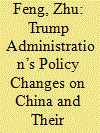

|
|
|
|
|
| Summary/Abstract |
This article analyzes the change in policy discourse of the
Trump administration and its destructive effects on US-China
relations. It begins with a retrospective look at the China
policies of two prior US administrations, those of President
George W. Bush and President Barack Obama, in order to
show just how significant the shift is. Following the review
are analyses of the new policy discourse on China and how
China has responded to it, especially in the context of the
coronavirus pandemic. The last section of this article discusses a popular theme in recent academic circles: Is a new Cold
War inevitable?
|
|
|
|
|
|
|
|
|
|
|
|
|
|
|
|
| 11 |
ID:
177652
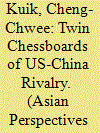

|
|
|
|
|
| Summary/Abstract |
This essay offers a small state perspective on US-China rivalry
in the post-COVID-19 era. After tracing the emergence of
the “twin chessboards” of big power rivalry, namely, high
and low politics competitions, the essay assesses the impact
of these competitions on the post-pandemic Asian order,
with a focus on Southeast Asia. I argue that while US-China competition has been rising rapidly in high politics (that
is, in the military field), the increasing importance of low
politics—infrastructure and connectivity development, technology, trade, finance, public health, and other functional
areas—is shaping the prospects, pace, and patterns of the
onset of Cold War 2.0. The intensified US-China animosity
across the twin chessboards is widening the scope of the
competition, increasing the number of players, and mounting pressure on all smaller states. Arguably, however, it is
also providing these smaller states with more maneuvering
space. These developments reshape geostrategic supply and
demand in Southeast Asia. Accordingly, the smaller states
are developing additional layers of partnerships with actors
near and far, thereby broadening their hedging options in
an increasingly uncertain and high-stake environment.
|
|
|
|
|
|
|
|
|
|
|
|
|
|
|
|
| 12 |
ID:
177651


|
|
|
|
|
| Summary/Abstract |
Passage of the African Continental Free Trade Area (CFTA)
occurs at a time of rising tensions between the United States
and China. Africa’s growth and development prospects depend on a functioning and stable multilateral trading system, but recourse to economic nationalism and protectionism is increasingly undermining the open global economy
and, indeed, the liberal international order on which free
and fair trade depends. This article examines the implications of US-China tensions for the CFTA while assessing the
opportunity for closer engagement between African countries and an axis of emerging powers led by China in an enhanced Global South strategy
|
|
|
|
|
|
|
|
|
|
|
|
|
|
|
|
| 13 |
ID:
177656


|
|
|
|
|
| Summary/Abstract |
Has America’s complex academic relationship with China
been a largely positive experience, or has it eroded our national security by enabling Chinese Communist academic espionage and influence operations to take root at US colleges
and universities? For almost forty years beginning in 1978,
US-China education links were widely considered a clear
benefit to both countries. Today, academic relationships
have become a focal point of the current crisis in US-China
relations. A web of suspicion has come down over Chinese
students and scholars in the United States, as well as Chinese
scientists and entrepreneurs. Some members of the Trump
administration have even talked about cancelling all Chinese student visas. This article focuses on Chinese students
and scholars in the United States. It examines the flashpoints
of academic espionage and China’s influence operations on
American campuses, looks at how American institutions are
responding, and closes with recommendations and reflections.
|
|
|
|
|
|
|
|
|
|
|
|
|
|
|
|
| 14 |
ID:
177647


|
|
|
|
|
| Summary/Abstract |
Human rights has been a contentious issue in US-China relations from their very beginning. In the early years the issue
was one-way, with Washington constantly criticizing political, legal, and social inequities in Mao’s China. China has
fought back, pointing to deficiencies in the US system while
proceeding in recent years to implement a large-scale program of detention and incarceration targeting Muslim minorities in Xinjiang. Neither the United States nor any other
country or international organization can compel adherence
to human rights norms in China. But setting an example of
such adherence does get noticed, and if a president Biden
aligns with Black Lives Matter, respects the rule of law, refuses to endorse dictators, and urges the US Senate to approve
and ratify all the UN conventions on human rights, he might
be more persuasive in urging Beijing to change its direction
on human rights. But this is only conceivable if pursued in
the context of a new US policy of competitive coexistence
with China, and not strategic confrontation
|
|
|
|
|
|
|
|
|
|
|
|
|
|
|
|
| 15 |
ID:
177648
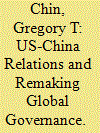

|
|
|
|
|
| Summary/Abstract |
In this article I examine the emerging crisis in major institutions of global governance, and the ways that US-China relations play crucially in the crisis and its potential resolution.
The mix of competition and cooperation in the US-China relationship during the Obama presidency resulted in progress
as well as stalemate in global governance, while the subsequent degeneration of relations during the Trump presidency has brought about crisis situations in major international
organizations, a critical change-point in global governance.
But the change is ambiguous; it can result either in organizational collapse or the pursuit of a fundamentally transformative outcome.
|
|
|
|
|
|
|
|
|
|
|
|
|
|
|
|
|
|
|
|
|